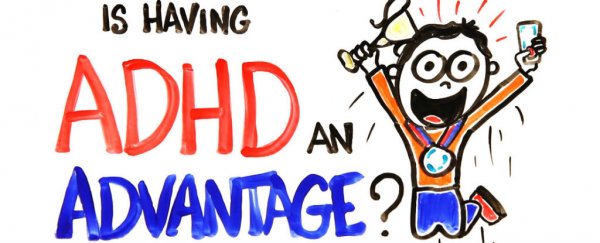
ADHD ( Attention deficit hyperactivity disorder) is the most commonly diagnosed psychiatric disorder among children and teenagers today, and while the name suggests it's not really something you want to be living with, research has shown that ADHD could bring some benefits to young people. So could ADHD be an evolutionary advantage? The latest episode of AsapSCIENCE above investigates.
While studies have linked drinking and smoking during pregnancy to instances of ADHD in children, the biggest factor by far that determines if you're going to be born with ADHD is your genes.
And not just any genes - most of the genes associated with ADHD are connected to the brain's reward pathways, so people with ADHD end up having lower levels of dopamine receptors (aka the 'feel-good' hormone). This means that they find it more difficult to feel satisfied or happy with what they're doing, so while everyone else is content to sit quietly and read a book, a kid with ADHD might get very easily bored.
We see further evidence of how ADHD affects a person's brain when you observe its activity via an fMRI machine. Usually, when the human brain is at rest, you will see activity in the default mode network, and when it's time to switch on again and get stuff done, the activity quickly transfers over to the task-focussed network to achieve better focus.
Oddly enough, in the brains of people with ADHD, this very neat switching process doesn't actually work. When a person with ADHD is trying to switch from rest to focus, their brain won't know which network to switch on, so when they're trying to focus and get work done, fMRI scans show activity in both the default mode network AND task-focussed network. Not great.
Scientists have also found that because of the structural changes in the brains of people with ADHD, they also struggle with things like attention control, emotional regulation, and response inhibition, the boys from AsapSCIENCE explain.
So that's the bad news… how could ADHD be an advantage to someone? Studies have suggested that when it comes to our ancient ancestors, having a short attention span and the tendency to never stop moving would have translated to higher levels of resources collected, which means greater success in the 'reproducing and passing on your genes' game.
But what about now? When looking at settled and nomadic members of the Ariaal tribe of Kenya, researchers have found that the nomads who had a greater number of genes linked to ADHD were better at hunting food.
And when it comes to creative pursuits, studies have also shown that people with ADHD tend to be more creative in both controlled experiments and real-life scenarios, because their brains are more susceptible to random, 'out of the box' thoughts.
On top of that, while ADHD might cause kids to struggle when trying to fit into very structured school and university routines, studies have shown that in adulthood, certain careers are better suited to people with high-energy.
Watch the video above by AsapSCIENCE to find out which careers give people with ADHD an advantage, and if you're struggling through school because of your ADHD right now, just remember - it's all uphill from here.
